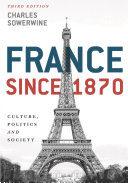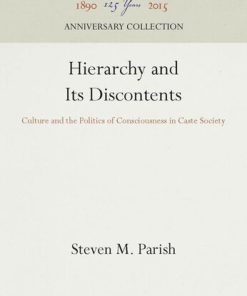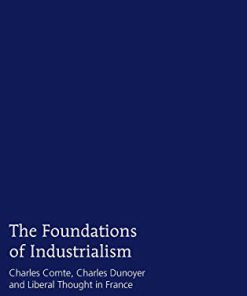France since 1870 Culture Politics and Society 3rd Edition by Charles Sowerwine ISBN 9781137406118 1137406119
$50.00 Original price was: $50.00.$25.00Current price is: $25.00.
France since 1870 Culture Politics and Society 3rd Edition by Charles Sowerwine – Ebook PDF Instant Download/Delivery: 9781137406118 ,1137406119
Full download France since 1870 Culture Politics and Society 3rd Edition after payment

Product details:
ISBN 10: 1137406119
ISBN 13: 9781137406118
Author: Charles Sowerwine
France since 1870 Culture Politics and Society 3rd Edition Table of contents:
Part I: The Rise of the Third Republic, 1870–85
Chapter 1: France in the Nineteenth Century
Paris, ‘Capital of the Nineteenth Century’
An Economy in Transition
French Society in the Nineteenth Century: Nobles and Bourgeois
French Society in the Nineteenth Century: Women
French Society in the Nineteenth Century: Workers from Farm to Factory
Chapter 2: The Franco-Prussian War and the Paris Commune, 1870–71
The Franco-Prussian War, 1870–71
The Proclamation of the Third Republic, 4 September 1870
The Siege of Paris, September 1870–February 1871
The Struggle for Paris, 1–18 March 1871
Paris under the Central Committee of the National Guard, 18–28 March 1871
‘The Days of the Commune’, 28 March–21 May 1871
La Semaine sanglante (The Week of Blood), 21–28 May 1871
Chapter 3: The Triumph of the Republicans, 1871–85
Building the Republic
Thiers in Power, 1871–73
The Monarchists in Power: ‘Moral Order’ vs the Republicans, 1873–76
The Republicans Come to Power, 1876–79
The Republic of Jules Ferry I: Republican Freedoms
The Republic of Jules Ferry II: Republican Schools
The Republic of Jules Ferry III: Republican Colonies
Chapter 4: The Cultural Bases of Republicanism
Reason and the Republican Project
Materialism and Anticlericalism
Freemasonry, Masculinity and the Republic
‘The Painters of Modern Life’
Time and Narrative
History and the Republic
Part II: Testing Time for the Republic, 1885–1918
Chapter 5: Challenges to the Republic (1): Constructing the Modern Right
Anti-Semitism and the New Nationalism
The New Nationalism and the Boulanger Affair, 1885–89
The Apogee of ‘Peasant France’?
The Panama Affair, 1889–93
The Church, the Republic and the Social Question, 1889–96
Dreyfus, from Case to Affair, 1894–97
The Dreyfus Affair and Mass Politics, 1898–1902
Chapter 6: Challenges to the Republic (2): Constructing the Modern Left
The Development of Social Movements
Feminism and the ‘New Woman’
Anarchism and Syndicalism
The Dreyfus Revolution
Clemenceau and the Defeat of Labour, 1906–10
Colonies, Alliances and the Origins of the Great War, 1898–1914
Chapter 7: The Cultural Revolution of the Belle Époque
New Cultural Space: The Montmartre Cafés
The Erosion of Realism
The Erosion of Objective Time
The Fragmentation of Perception
Chapter 8: The Great War, 1914–18
From War of Movement to Stationary War
The Trenches
The Home Front
The Evolution of the War
Peace Movements during the War
Wild Cards: Russia, America and Clemenceau
Victory
Counting the Losses
Part III: The Decline of the Third Republic, 1919–40
Chapter 9: France after the War, 1919–28
Class Struggle and the Elections of 1919
Gender Struggle: Repression
Gender and Race: Public Space and Diversity
Class Struggle Again
National and International Affairs: From Peace to Crises
From First-Wave Fascism to the Poincaré Years
Chapter 10: France in the Depression, 1929–35
Everyday Life in the Depression
Politics and Second-Wave Fascism
The Stavisky Affair and the Riots of 6 February 1934
Republican Response to 6 February 1934
Chapter 11: The Popular Front, 1936–37
Origins of the Popular Front
The Popular Front and the Strikes of May–June 1936
The Popular Front and Women
The Matignon Agreements and Popular Front Reforms
The Challenge of Spain
The ‘Wall of Money’?
Chapter 12: Culture between the Wars
Dadaism and Surrealism
Early Cinema
The Revolt in Music
Surrealism, Art and Art Deco
The Literature of War and Despair
The Literature of Reform and Revolt
Cinema and Politics
Chapter 13: The Fall of France, 1938–40
Foreign Policy, 1924–38
The Anschluss and Munich
The Death of the Popular Front and the Rise of Fascism
Gender Struggle
Towards War
The French Army and the Blitzkrieg
The Armistice and the Death of the Republic
Part IV: Vichy and Its Aftermath, 1940–46
Chapter 14: The Vichy Government, 1940–42
Was Vichy Fascist?
The Vichy Government
The Cult of Personality
Vichy’s National Revolution
Vichy’s Search for Collaboration
The Politics of Exclusion
French Participation in the Holocaust
Explaining French Participation in the Holocaust
Chapter 15: Resistance and Liberation, 1942–44
Charles de Gaulle and the Call
The Beginnings of Resistance
The Stakes Are Raised, 1940–43
The Resistance: From Isolated Actions to Mass Movement, 1942–44
The Liberation
Chapter 16: Liberated France, 1944–46
The Struggle for Authority
The Purge
The Price of War
Reform and Reconstruction
Rebuilding the Republic
The Parties Write a Constitution
Liberated Paris
Chapter 17: Existentialism: Culture of the Resistance?
Beauvoir, Camus and Sartre
The Effect of the War
From the Liberation to Le Deuxième Sexe
From Hope to Despair
Culture in the 1950s: The Theatre of the Absurd
Part V: The Fourth Republic, 1946–58
Chapter 18: Vietnam War, Cold War, 1946–54
The Colonial Heritage
An Autonomous Vietnam in the French Union?
The Eruption of the Cold War in French Politics
The Cultural Politics of the Cold War
The Cold War and the Marshall Plan
Social Explosion, 1947
The Beginnings of European Institutions
The ‘Third Force’ and the 1951 Elections
On to Dien Bien Phu
Pierre Mendès France and the Geneva Conference
Chapter 19: The 1950s: Coke, Culture and the French Economic Miracle
The French Economic Miracle
‘Fast Cars, Clean Bodies’
Modernization or Americanization?
France versus America: The Culture Wars
Chapter 20: The Algerian War Erupts, 1954–57
Algeria in Historical Perspective
The Fall of Mendès France
Fallout in Paris: The 1956 Elections
Guy Mollet Escalates the War
The Suez Invasion
Torture: The Battle of Algiers
Chapter 21: The Fall of the Fourth Republic, 1958
From International Incident to National Crisis
‘The 13 Plots of 13 May’
Rebuilding the State in Algeria
Rebuilding the State in France
Part VI: The Fifth Republic I, 1958–81
Chapter 22: De Gaulle’s Presidency, 1958–68: Algeria vs ‘Grandeur’
Putting Down the Generals
Torture and Anti-War Movements
Attempted Putsch and Terror
The Evian Accords
Domestic Politics under de Gaulle
Economic Growth
The Politics of ‘Grandeur’: Industry and Foreign Policy
The Politics of ‘Grandeur’: Urbanism and Culture
Chapter 23: Cultural Explosion: New Theory, New Cinema, New Novel
New French Theory and Post-Modernism
Three Precursors: Saussure, Lacan, Lévi-Strauss
Roland Barthes
Michel Foucault
Jacques Derrida
The ‘New Novel’
‘New Wave’ Cinema
Chapter 24: Social Explosion: May ’68
A Crisis in Higher Education
A New Critique of Modern Society
Radicalization
Explosion
The Workers Join, Everyone Joins
From Revolt to Revolution?
Defeat
The Legacy of May
Epilogue
Part VII: The Fifth Republic II, 1969–95
Chapter 25: Pompidou’s and Giscard’s Presidencies, 1969–81: May’s Aftershocks and the End of the Trente Glorieuses
Politics, Groupuscules and Worker ‘Insubordination’
Women’s Rights, Gay Rights
Pompidou and Vichy
The Common Market and the Renewal of the Left
Pompidou and Paris
Last Years of the Trente Glorieuses
Women and Men in the New Industrial Revolution
Valéry Giscard d’Estaing: Liberal Reform?
Oil Crisis, Permanent Crisis
Politics in the Late 1970s
Chapter 26: Mitterrand’s Presidency, 1981–88: ‘Socialist France’?
The Three Icebergs
Creating ‘Socialist France’, 1981–82
The Lasting Reforms
Technology
Mitterrand and Women: Almost All the Way to the Altar
The ‘Wall of Money’ Again? 1982–83
Treading Water, 1984–86
Immigrants and the Front national
Cohabitation, 1986–88
Chapter 27: Mitterrand’s Presidency, 1988–95: Stalemate
Michel Rocard’s Government, 1988–91
Integration and Foulards
From Berlin to Maastricht: Foreign Policy and Europe, 1989–92
The Socialists in Decline
Celebrating Revolution, Exposing Collaboration
Mitterrand, Chirac and Paris
Édouard Balladur’s Government, 1993–95
Towards the Presidential Elections of 1995
Epilogue: The End of the Mitterrand Era
Chapter 28: Culture after ’68: Conflicting Trends
Post-Modernism, Feminism and Gay Rights
The End of Post-Modernism?
‘New Philosophers’, Reactionary Pessimists and Déclinistes
Literature after ’68
‘The Beur Moment’
Cinema after the New Wave
Chapter 29: Chirac’s Presidency, 1995–2002: From Juppé to Jospin
The 1995 Strikes
The Surprise Elections of 1997: Socialist Renaissance
Lionel Jospin’s Tightrope Act, 1997–2002
Liberalism, Globalization and the EU
Towards Gay Liberation: The PaCS
Towards Women’s Equality: The Parity Amendment
Revising the Constitution: The Quinquennat
Remembering Vichy, Forgetting Algeria
Presidential Elections 2002: Vichy’s Revenge
Part VIII: The Fifth Republic III, 1995–2017
Chapter 30: Chirac’s Presidency, 2002–07: Sarkozy Rising
The Iraq War: France Out in the Cold
Integration: The Foulard Crisis, 2002–04
The Colonial Past: Papon and La Querelle des Mémoires, 2002–07
Rejecting the EU, 2004–05
The Banlieue Riots, October 2005
Neo-Liberalism? The ‘CPE’ Riots, February–March 2006
New Museums
Sarko/Ségo, 2006–07
Chapter 31: Sarkozy’s Presidency, 2007–12: Neo-Liberalism and the GFC
Sarkozy’s First Year: Bling and Bush
Sarkozy’s First Year: Tax Cuts and Shocks
France and the GFC
Judges and Regions
Playing the Muslim Card
Pensions and Scandals
The Rise of the FN
Presidential Elections 2012
Chapter 32: Hollande’s Presidency, 2012–17: Socialism or Neo-Liberalism?
Jean-Marc Ayrault’s Government, 2012–14
Locking in Austerity
A Government Divided
Austerity, For and Against
A ‘Normal Presidency’?
Paris in the Twenty-First Century
The Loi Macron
‘Je Suis Charlie’
Macron and the Loi Macron
The Front National, Politics and Terror
The 2016 Labour Law
Terror Again
Presidential Elections 2017
Legislative Elections 2017
A Sixth Republic?
Chapter 33: Racism, Pessimism, Despair: A Culture for the Twenty-First Century
Beur Writing since 1995
Cinema: A Success Story and an Escape
Thought for a Neo-Liberal Age: Facing Up to Inequality
Thought for a Neo-Liberal Age: Pessimists, Déclinistes and Néoréacs
Literature for a Neo-Liberal Age: Narcissism and Despair
The New Public Intellectual
Conclusion
The Weight of the Past
Colonialism and Racism
Integration and the State
France in the EU
France and Neo-Liberalism
A Just Society?
Corruption and Justice
French Culture in the Twenty-First-Century World
The Identity of France
Notes
Suggestions for Further Reading
Index
People also search for France since 1870 Culture Politics and Society 3rd Edition:
sowerwine charles france since 1870 culture politics and society
what was happening in france in the 1870s
what is culture politics and society
french food culture history
political history of france timeline
Tags: Charles Sowerwine, France, 1870, Culture, Politics, Society
You may also like…
Uncategorized
Brazilian History Culture Society Politics 1500 2010 1st Edition Roberto Pinheiro Machado
Uncategorized
Politics & Philosophy - Politics
History - European History
Uncategorized
Politics & Philosophy - Government & Politics
Psychology - Psychotherapy





![Guns in American Society: An Encyclopedia of History, Politics, Culture, and the Law [3 volumes] 3rd Edition Jaclyn Schildkraut](http://ebookmeta.com/wp-content/uploads/2024/05/guns-in-american-society-an-encyclopedia-of-history-politics-culture-and-the-law-3-volumes-50214442.jpg)





